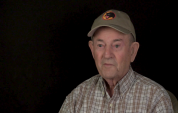4:46 | There was a French family on a cattle farm who offered to wash clothes for George Lavoie's unit. He spoke French and got to know them and was astounded when the farmer revealed something valuable he had hidden from the Germans. (This interview made possible with the support of COL ROBERT W. RUST, USMCR (ret.) in honor of LtGen Lawrence Snowden & LtGen George Christmas.)
Keywords : George Lavoie France Lorient farm gold German

George Lavoie was in a quartermaster outfit in New York City and he jumped at the chance to transfer into the infantry. He went south to Camp Rucker to train with the 66th Infantry Division.(This interview made possible with the support of COL ROBERT W. RUST, USMCR (ret.) in honor of LtGen Lawrence Snowden & LtGen George Christmas.)
His convoy bound for England ran into a German submarine wolf pack, but air cover and escort ships kept them at bay. Once there, George Lavoie was lucky. When it was time to cross the Channel, he did not board the ill-fated SS Leopoldville, which was sunk within sight of Cherbourg.(This interview made possible with the support of COL ROBERT W. RUST, USMCR (ret.) in honor of LtGen Lawrence Snowden & LtGen George Christmas.)
The job was to contain a large pocket of German troops in France. George Lavoie recalls one patrol in which they knocked out a communications tower built to support the new German jet planes. The blizzard of December 1944 made this mission very difficult. (This interview made possible with the support of COL ROBERT W. RUST, USMCR (ret.) in honor of LtGen Lawrence Snowden & LtGen George Christmas.)
George Lavoie describes the combat during his time in France in a standoff with German troops. The enemy was in a large isolated pocket on the Atlantic coast. Once, he called in an artillery strike on some lunch preparations. Then there was his thirsty friend who went into town for a little drink. (This interview made possible with the support of COL ROBERT W. RUST, USMCR (ret.) in honor of LtGen Lawrence Snowden & LtGen George Christmas.)
Since he could speak French, George Lavoie was sometimes called upon as a translator. He was serving in France near the end of the war. Once it had ended in both theaters, he had a few months of occupation duty, then home to start worrying about a job. (This interview made possible with the support of COL ROBERT W. RUST, USMCR (ret.) in honor of LtGen Lawrence Snowden & LtGen George Christmas.)